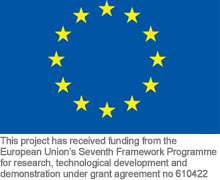Donatella Fazio, from Istat, co-ordinator of Web-COSI project explains how it is designed to increase the engagement of society at large for better statistics beyond GDP.
The two-year EU FP7 Web-COSI (Web-Communities for Statistics for Social Innovation) project officially began on 1 January, 2014. It is co-ordinated by the Italian National Statistical Institute (Istat) with the partnership of the OECD (the Organisation for Economic Co-operation and Development) and two young civil society organisations (Lunaria – the Italian Association for Social Promotion, and i-genius – the Social Entrepreneur Business and Enterprise Community, in the UK).
Web-COSI is funded by the EC-DG CONNECT within the FP7 ICT Work Programme 2013, responding to the Collective Awareness Platforms for Sustainability and Social Innovation (CAPS) call ICT10. Within the Europe 2020 strategy and the priorities of the Digital Agenda for Europe (DAE), the call ICT10 had the general objective ‘to stimulate and support the emergence of innovative ICT-based platforms for grassroots social innovation, providing societally, environmentally and economically sustainable approaches and solutions to tackle societal challenges. Such collective intelligence platforms will include collective decision making tools, and innovation mechanisms allowing and encouraging individualand community creativity, participation and situational awareness’.
Engagement
Following the request of the call, Web-COSI – based on the idea that collaboration through crowd-sourced platforms can produce solutions for a wide range of social needs – is designed with the general objective to foster the engagement of citizens and society at large in the area of the new measurements of wellbeing, societal progress and sustainability.
On 9 January 2014, the Web-COSI kick-off meeting was organised in Istat’s premises in Rome to illustrate the project to a selected number of participants from academia and industry, as well as to researchers from both public and private institutions who had been invited as representatives of relevant stakeholders. The presentations, delivered by high level representatives from the Italian National Statistical Institute, the European Commission, and Eurostat, together with the partners of the project consortium, placed Web-COSI in its context and defined its activities in the wider frame of the integration of official and non-official data within the GDP and beyond debate.
Background
Web-COSI is built-up on the background provided by the discussion taking place on a global level during the last decade on the complex phenomena related to GDP and beyond, carried out by various initiatives involving, firstly, the public and private world of research and currently, countless of local, national and international actors: civil society organisations, social entrepreneurs, researchers, practitioners, consumers, workers, citizens and society at large.
Several specific research initiatives set up from the beginning of the new millennium initiated a wide reflection on the various themes and multiple dimensions of the progress of societies. Amongst these, the OECD World Forums (Palermo 2004, Istanbul 2007, Busan 2009 and New Delhi 2012) and the famous Stiglitz-Sen-Fitoussi Commission (2008) contributed strongly to give a global dimension to the beyond GDP debate.
At the European level, initiatives carried out by the European Commission have pushed for the establishment of concrete actions for the definition of better statistics beyond GDP. The EU’s ‘Beyond GDP Initiative’, launched in 2007, also deserves mention, as does the establishment of the sponsorship group on ‘Measuring Progress, wellbeing and sustainable development’ by the European Statistical System Committee (2009), which concluded its work in 2011.
Evolution
Over time, the debate on measuring wellbeing and societal progress ‘beyond GDP’ has evolved, creating a global movement involving a multiplicity of actors in the discussion for the definition of better statistics beyond GDP. The internet has contributed enormously in enlarging the community involved in this discussion. Web 2.0 provides the opportunity to share information and data and to implement new ways of collecting and producing information, making a bottom-up approach possible.
In addition to the traditional stakeholders – national statistical institutes (NSis), academia, researchers, international organisations – new actors are also willing to voice their opinions: civil society organisations, social entrepreneurs, consumers, workers, citizens, and society at large. This new approach has led to the establishment of various initiatives which aim to better interact with the communities.
Recent notable initiatives include the OECD’s Better Life Index, which was launched in 2012 to answer one of the world’s most pressing questions: are our lives getting better? The index is an interactive tool that illustrates how countries perform according to the importance the user gives to each of the topics that make for a better life.
On the side of the EU NSIs, in order to develop official statistics beyond GDP, stakeholder’s consultations and discussions with society at large began to be carried out. In 2010, Istat and the Italian National Council for Economics and Labour (CNEL) created the ‘BES’ initiative, which was designed to measure ‘Equitable and Sustainable Wellbeing in Italy’, within which a deliberative process for the definition of a theoretical framework for the measurement of wellbeing and the selection of the indicators as a decision co-established by Italian society at large has now been developed.
Web-COSI
Against this background, the Web-COSI project provides its contribution by co-ordinating activities to promote the engagement of society at large for the definition of better statistics beyond GDP, as well as the use of non-official data.
The project is based on a four-partner consortium that sees collaboration between two relevant institutions (Istat and the OECD), alongside Lunaria and i-genius, which represent society at large. The partners are linked by complementing expertise but, above all, each one represents a strategic actor in the progress of the statistics debate. The consortium as a whole is multidisciplinary and well balanced so as to work towards creating synergies and critical mass, thereby leveraging the network effect towards the implementation of new ways of collecting and producing information and data and to involve and motivate citizens to contribute to and access statistics (both official and non-official).
Web-COSI capitalises on the ICT innovations that, in the last decade, have directly impacted on statistical data collection, production, dissemination, visualisation and retrieval. Web 2.0 applications (Wikipedia, Facebook and Twitter) have introduced a new participatory process. The interaction amongst the online communities allows producers and consumers of information to meet without ‘boundaries’, exploring the role of official and non-official statistics, and contributing to shape the way that information and data are collected, produced and shared.
Objectives
Web-COSI will work in the context of the CAPS projects, creating synergies with the diverse categories of the communities of users and stakeholders.
The two-year work plan foresees a number of activities carried out by the four partners: beginning with the mapping of beyond GDP existing digital initiatives, thus distilling the best practices of the involvement of the communities for the progress statistics (experiences carried out by the NSIs, by civil society organisations and social entrepreneurs).
In the following months the work plan will carry on specific initiatives and targeted online campaigns with the aim of empowering the engagement of communities in the debate on progress statistics, reaching a high level of citizens’ involvement at the end of the project. The development of a Wiki of progress statistics, at the mid term point of the project, will constitute a tool to manage the collection of civil society, grass root, locally-generated non-official data which can be integrated with official data.
Moreover, five stocktaking and reporting documents on the involvements of communities on statistics beyond GDP in Europe and abroad will be delivered. Finally communication and dissemination through face-to-face events will be organised: five workshops, four focus groups and a final conference.
The activities of the project will be carried out and reported using internet platforms managed by the partners, using social networks, online discussions, blogs, e-brief and an extensive network and local grassroots partnerships creating synergies in order to move towards a growing integration of top-down and bottom-up approaches. A strong communication strategy on the on-going work will be carried out through videos and short films for social media distribution.
The consortium will be supported by an advisory board, composed outstanding known personalities, who will provide advice and guidance for the development of the project to ensure high quality and excellence.
Moving forward
As the starting point of the project, the kick-off meeting represented a very fruitful event which highlighted the relevance of the project for the European Commission and Eurostat, for statisticians in general and for the wider public. The somewhat challenging project is therefore starting in a context where the official statistics are moving from traditional to new ways of data collection and production. Web 2.0 invites data producers to take advantage of such a great opportunity.
During the presentations and discussion, many elements of the project, in terms of its activity, emerged, some of which represent points of strength, and others key points that shall contribute to steer the activities of the project.
With the confidence that the project will contribute to a growing integration and complementarity of official statistics and non-official data, its results will pave the way for future research needs by identifying the open issues for the usage of crowd-sourced data. There is thus a pressing need to set out the priorities and to get to work, not least because the internet is showing us that the future is now.
The Web-COSI project has received funding from the European Union’s Seventh Framework Programme for research, technological development and demonstration under grant agreement no 610422.
Donatella Fazio
Italian National Statistical Institute (Istat) Senior Statistician
Head of Unit ‘R&D Projects’ Web-COSI project co-ordinator
email dofazio@istat.it
browse www.webcosi.eu
This article first appeared on Pan European Networks: http://www.paneuropeannetworks.com/
The article can be printed out here: http://www.paneuropeannetworks.com/ST11/#30

